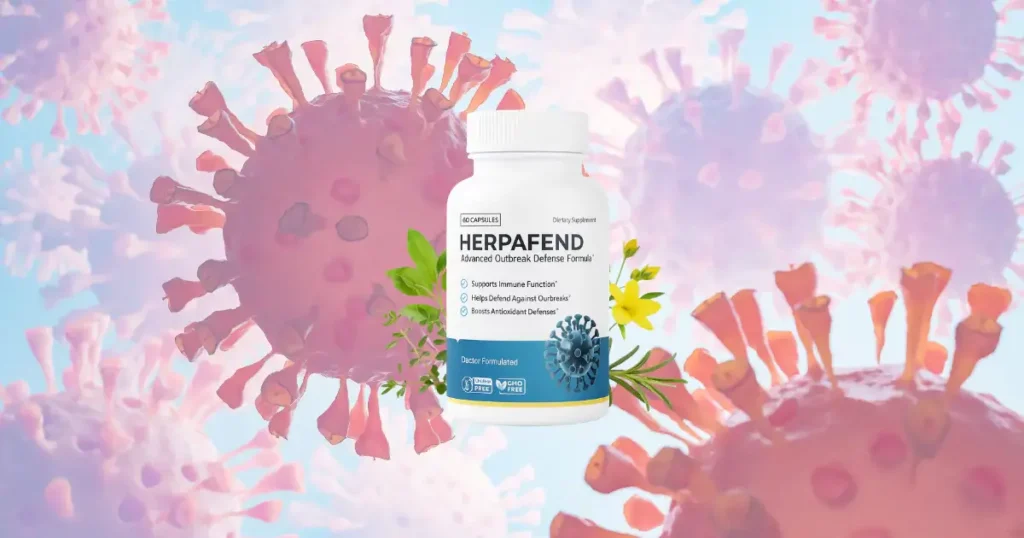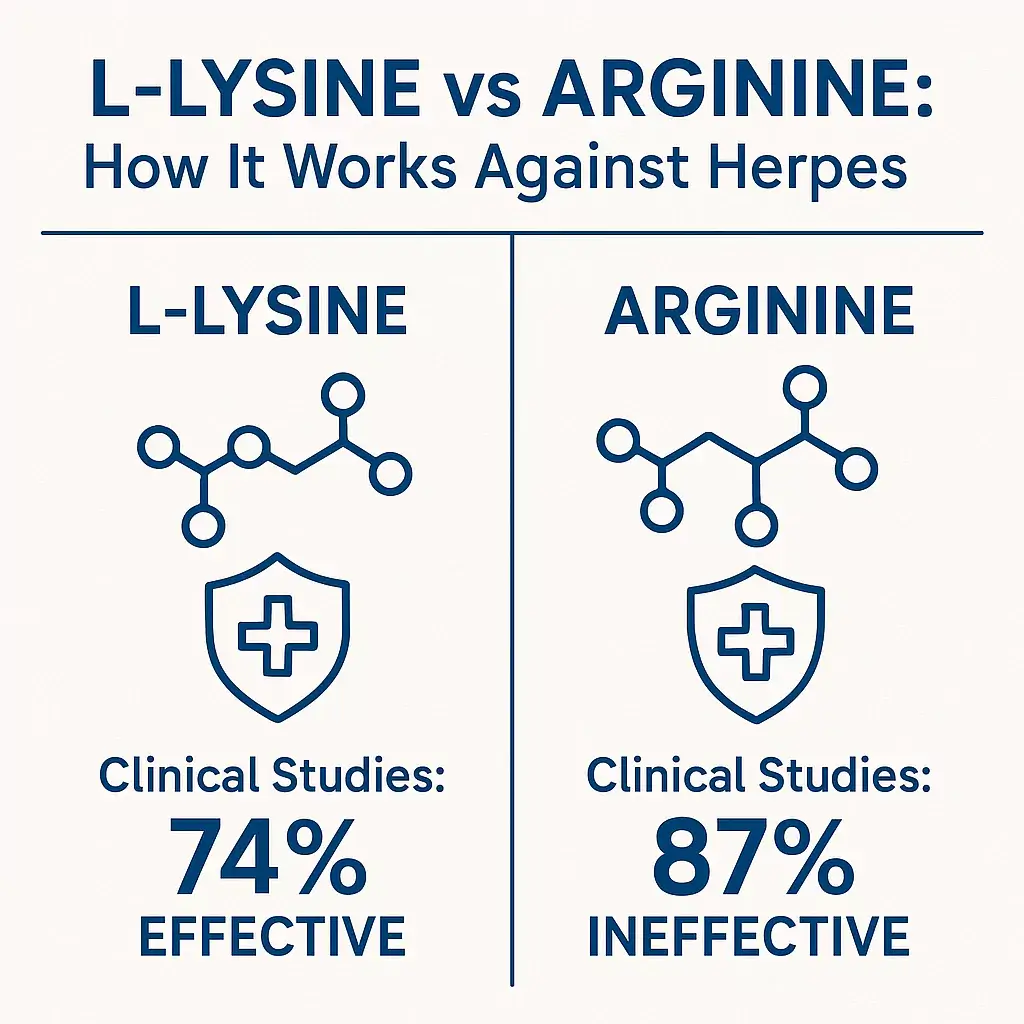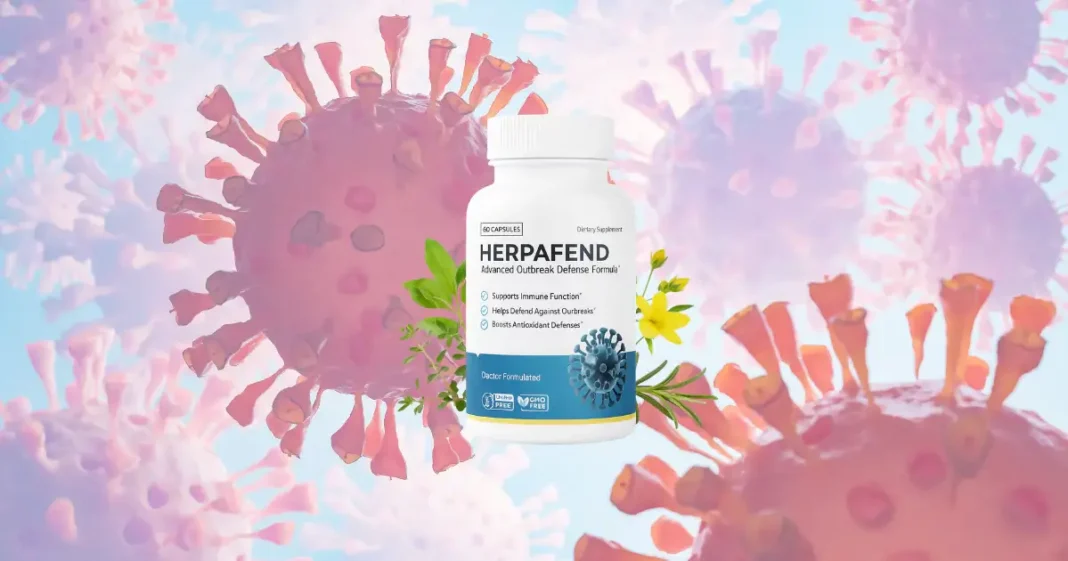Understanding the Global Herpes Challenge
Herpes simplex virus (HSV) represents one of the most widespread viral infections globally, affecting billions of people worldwide. According to recent WHO data, an estimated 3.7 billion people under age 50 have HSV-1 (oral herpes), while approximately 520 million people aged 15-49 live with HSV-2 (genital herpes). In the United States specifically, the CDC reports that 47.8% of people aged 14-49 have HSV-1, while 11.9% have HSV-2.

These statistics underscore a significant public health challenge that extends beyond mere numbers. Herpes infections are lifelong conditions that can cause recurring outbreaks, physical discomfort, psychological distress, and social stigma. Traditional antiviral medications, while effective for managing active outbreaks, often come with limitations including side effects, cost considerations, and the need for frequent dosing during flare-ups.
In this comprehensive analysis, we examine HerpaFend, a natural dietary supplement that claims to support immune function and help reduce herpes outbreak frequency through botanical ingredients and nutritional support.
What is HerpaFend?
HerpaFend is a natural dietary supplement specifically formulated to provide immune system support for individuals managing herpes virus infections. According to the manufacturer, the product combines traditional herbal wisdom with modern nutritional science to create a comprehensive immune support formula designed to work preventively rather than reactively.
Key Product Features
- Natural ingredient profile: Contains botanicals, vitamins, and minerals
- Manufacturing standards: Produced in FDA-approved facilities following Good Manufacturing Practices (GMP)
- Daily supplement format: Designed for consistent, long-term use as part of a wellness routine
- Preventive approach: Focuses on immune support and outbreak prevention rather than acute treatment
The supplement is positioned as an alternative or complementary approach to conventional antiviral medications, targeting the immune system’s ability to keep the herpes virus in its dormant state.
The Science Behind L-Lysine and Herpes Management
One of the primary ingredients discussed in relation to herpes management is L-lysine, an essential amino acid that has been studied extensively for its potential antiviral properties. Understanding the research behind L-lysine provides crucial context for evaluating supplements like HerpaFend.
Clinical Research on L-Lysine
A comprehensive review of L-lysine research published in PMC found that “L-lysine supplementation appears to be ineffective for prophylaxis or treatment of herpes simplex lesions with doses of less than 1 g/d without low-arginine diets. Doses in excess of 3 g/d appear to improve patients’ subjective experience of the disease”.
Earlier studies showed more promising results, with one double-blind, placebo-controlled trial demonstrating that 1,000 mg of L-lysine taken three times daily led to beneficial effects in 84% of participants, who reported that lysine supplementation prevented recurrence or decreased the frequency of herpes infection.
Mechanism of Action
The theoretical mechanism behind L-lysine’s potential antiviral effects involves “competitive antagonism with amino acid arginine, which is an essential amino acid for some viruses.” Research suggests that lysine may interfere with viral replication by limiting the availability of arginine, which herpes viruses require for reproduction.
However, it’s important to note that the scientific evidence remains mixed. Recent systematic reviews conclude that “longer duration controlled studies of daily lysine doses exceeding 1.2 g/d are required to definitively test its role in herpes simplex prophylaxis”.

Evaluating HerpaFend’s Approach
Ingredient Analysis
While the complete ingredient profile of HerpaFend isn’t fully detailed in publicly available information, the manufacturer mentions several key components:
L-Lysine: As discussed above, this amino acid represents the most researched ingredient for herpes management, though optimal dosing remains under investigation.
Vitamin C: A well-known antioxidant that supports immune function and may help reduce inflammation associated with viral infections.
Elderberry Extract: Contains compounds with demonstrated antiviral properties in laboratory studies, though specific research on herpes viruses is limited.
Echinacea: Traditionally used for immune support, though clinical evidence for preventing viral outbreaks specifically is inconclusive.
Vitamin D3: Essential for immune system regulation, with deficiency linked to increased susceptibility to viral infections.
Zinc: Plays crucial roles in immune function and wound healing, potentially supporting faster recovery from outbreak-related skin lesions.
Manufacturing and Quality Standards
HerpaFend is reportedly manufactured in FDA-approved facilities following Good Manufacturing Practice standards. This is significant for several reasons:
- Quality control: GMP standards require consistent production processes and testing protocols
- Ingredient verification: Ensures that listed ingredients match actual product contents
- Contamination prevention: Reduces risks of harmful substances in final products
- Regulatory compliance: Meets basic safety requirements for dietary supplements
However, it’s important to understand that FDA approval for facilities doesn’t constitute FDA approval of the supplement itself or its health claims.
Customer Experience and Reported Outcomes
User testimonials provide valuable insights into real-world experiences with HerpaFend, though individual results can vary significantly based on factors including overall health, lifestyle, stress levels, and immune system function.
Reported Benefits
According to customer feedback available on the manufacturer’s website, users report:
- Reduced outbreak frequency: Many customers claim experiencing fewer herpes outbreaks after consistent use
- Faster healing times: Some users report that when outbreaks do occur, lesions heal more quickly
- Improved overall wellness: General immune support leading to better overall health
- Fewer side effects: Compared to prescription antivirals, users appreciate the natural approach
Timeline for Results
The manufacturer suggests that most users notice changes within 2-3 months of consistent daily use, with some individuals requiring 4-6 months for optimal results. This timeline aligns with the gradual nature of nutritional interventions, which typically require time to build up effective levels in the body.
Important Considerations
It’s crucial to approach customer testimonials with appropriate skepticism, as:
- Individual experiences may not be representative of typical results
- Placebo effects can influence perceived outcomes
- Selection bias may mean that satisfied customers are more likely to provide testimonials
- The absence of controlled conditions makes it difficult to attribute improvements specifically to the supplement
Safety Profile and Potential Side Effects
Natural doesn’t automatically mean risk-free, and it’s important to consider the safety profile of any supplement.
General Safety
L-lysine, the primary researched ingredient in herpes management supplements, is generally considered safe for most adults when taken in doses up to 3,000 mg daily. Most people can tolerate lysine supplementation without significant side effects.
Potential Side Effects
Higher doses of lysine (10-15g daily) may result in digestive issues such as stomach pain and diarrhea. Other potential considerations include:
- Gastrointestinal upset: Some individuals may experience nausea or digestive discomfort when starting supplementation
- Interactions with medications: Always consult healthcare providers before combining supplements with prescription medications
- Individual sensitivities: People with specific allergies should carefully review ingredient lists
Special Populations
Certain groups should exercise particular caution: “Doctors do not recommend lysine supplements for children, pregnant people, or those who are nursing. People taking lysine supplements should monitor their cholesterol levels due to the potential link with higher cholesterol. Anyone with kidney or liver problems should avoid taking lysine supplements”.
Comparing Natural Approaches to Conventional Treatment
Understanding how natural supplements like HerpaFend compare to conventional antiviral medications helps consumers make informed decisions about their herpes management strategy.
Conventional Antiviral Medications
Standard antiviral treatments (acyclovir, valacyclovir, famciclovir) offer:
- Proven efficacy: Extensive clinical research demonstrates effectiveness for reducing outbreak duration and severity
- Fast-acting relief: Can provide rapid symptom relief when taken at outbreak onset
- Suppressive therapy: Daily dosing can significantly reduce outbreak frequency
However, conventional medications also have limitations:
- Cost considerations: Can be expensive, especially for long-term suppressive therapy
- Side effects: May cause headaches, nausea, or other adverse reactions
- Drug resistance: Rarely, viruses may develop resistance to antiviral medications
Natural Supplement Approach
Natural supplements like HerpaFend offer different advantages:
- Preventive focus: Emphasizes immune support and prevention rather than treatment
- Fewer side effects: Generally milder adverse reaction profile
- Holistic wellness: May provide additional health benefits beyond herpes management
- Long-term sustainability: May be more suitable for extended use
The trade-offs include:
- Limited clinical evidence: Less rigorous research compared to prescription medications
- Variable quality: Supplement industry regulation is less stringent than pharmaceuticals
- Slower onset: Natural approaches typically require longer timeframes to show effects
Cost-Benefit Analysis
When evaluating HerpaFend, cost considerations play an important role in determining overall value.
Pricing Structure
Based on available information, HerpaFend appears to be priced competitively within the natural supplement market. The manufacturer offers:
- 60-day money-back guarantee: Provides risk mitigation for first-time users
- Bulk purchasing options: Potentially reduced per-bottle costs for long-term users
- No prescription required: Eliminates doctor visit costs for obtaining the supplement
Value Comparison
Comparing costs to prescription antivirals:
- Daily suppressive therapy: Prescription antivirals can cost $100-300+ monthly without insurance
- Episodic treatment: Per-outbreak costs vary but can accumulate over time
- Insurance coverage: May reduce out-of-pocket costs for prescriptions but varies by plan
For individuals without insurance coverage or those seeking natural alternatives, supplements like HerpaFend may represent a more affordable long-term option.
Scientific Limitations and Research Gaps
Honest evaluation requires acknowledging the limitations in current research on natural herpes management approaches.
Research Quality Concerns
Systematic reviews of L-lysine research have noted quality concerns: “Of the articles in Table 1 only, Thein and Hurt was selected for inclusion in a Cochrane Skin Group review of randomized controlled trials, and this was deemed to be ‘very low’ quality evidence due to imprecision and bias”.
Need for Additional Studies
The scientific community has consistently called for more rigorous research:
- Longer-duration studies: Most existing trials are relatively short-term
- Larger sample sizes: Many studies involve small numbers of participants
- Standardized dosing protocols: Optimal dosing remains unclear
- Head-to-head comparisons: Direct comparisons with conventional treatments are limited
Publication Bias Considerations
Some researchers have noted potential conflicts of interest in the lysine research literature: “Several of the researchers who published about lysine and HHV-1 held a position at a pharmaceutical company manufacturing lysine supplements, and we therefore feel there was a conflict of interest”.
Making an Informed Decision
Given the complexity of herpes management and the varying quality of available evidence, consumers should approach supplements like HerpaFend with informed caution.
Factors to Consider
Personal Health Status: Individuals with compromised immune systems, other health conditions, or those taking medications should consult healthcare providers before starting any new supplement regimen.
Realistic Expectations: While some users report positive experiences, natural supplements are unlikely to completely eliminate herpes outbreaks for most people.
Quality of Life Impact: Consider how current symptoms affect daily life and whether potential benefits justify the investment in time and money.
Integration with Medical Care: Natural supplements should complement, not replace, regular medical care and professional guidance.
Questions for Healthcare Providers
Before starting HerpaFend or similar supplements, consider discussing these points with a healthcare provider:
- Is this supplement appropriate given your current health status and medications?
- What realistic outcomes can you expect based on available research?
- How should you monitor for potential interactions or side effects?
- What signs would indicate you should discontinue use?
- How does this approach fit into your overall herpes management strategy?
The Importance of Holistic Herpes Management
Effective herpes management extends beyond any single supplement or medication. A comprehensive approach typically includes:
Lifestyle Factors
- Stress management: Chronic stress can trigger outbreaks
- Adequate sleep: Essential for immune system function
- Balanced nutrition: Supports overall immune health
- Regular exercise: Enhances immune system resilience
Dietary Considerations
- Lysine-rich foods: Including legumes, fish, and dairy products
- Limiting arginine: Reducing nuts, chocolate, and certain grains during outbreak-prone periods
- Anti-inflammatory foods: Supporting overall immune function
Psychological Support
- Counseling: Addressing stigma and psychological impact
- Support groups: Connecting with others facing similar challenges
- Education: Understanding the condition reduces anxiety and improves management

Conclusion
HerpaFend represents an attempt to provide natural support for herpes management through immune system enhancement and nutritional intervention. While some ingredients, particularly L-lysine, have research support suggesting potential benefits, the overall evidence base remains mixed and requires more rigorous investigation.
Current research suggests that for L-lysine specifically, “doses in excess of 3 g/d appear to improve patients’ subjective experience of the disease,” though “longer duration controlled studies of daily lysine doses exceeding 1.2 g/d are required to definitively test its role in herpes simplex prophylaxis”.
For individuals seeking natural approaches to herpes management, HerpaFend may represent a reasonable option to explore, particularly when:
- Used as part of a comprehensive management strategy
- Initiated with realistic expectations about potential outcomes
- Monitored by healthcare professionals familiar with the individual’s health status
- Discontinued if no benefits are observed after an appropriate trial period
The 60-day money-back guarantee provides some protection for consumers wanting to trial the product, though optimal evaluation may require longer timeframes given the episodic nature of herpes outbreaks.
Ultimately, the decision to try HerpaFend should be individualized based on personal circumstances, health status, current management strategies, and consultation with healthcare providers familiar with both conventional and integrative approaches to herpes management.
As research in this area continues to evolve, consumers benefit most from staying informed about emerging evidence while maintaining realistic expectations about what any single intervention can achieve in managing this common but complex viral condition.
This article is for educational purposes only and should not replace professional medical advice. Always consult healthcare providers before starting new supplements or changing existing treatment regimens.

